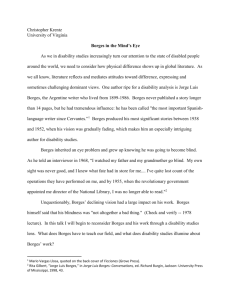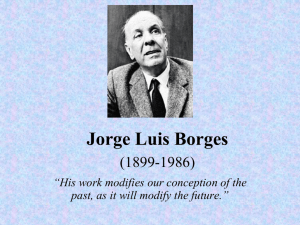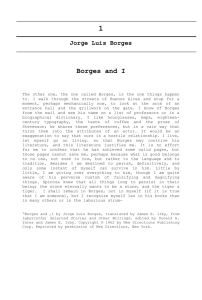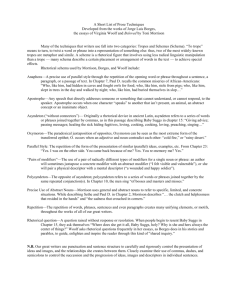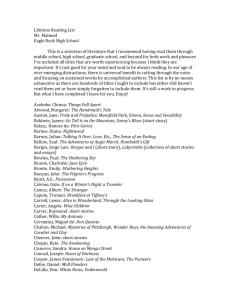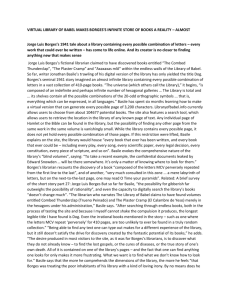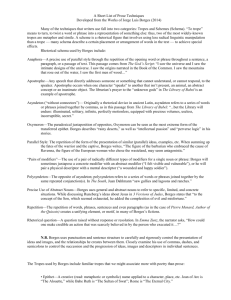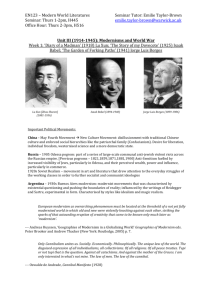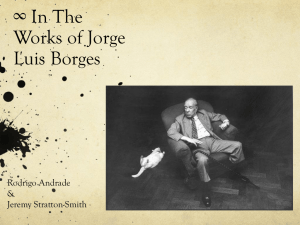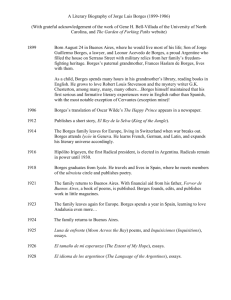Jorge Luis Borges
advertisement
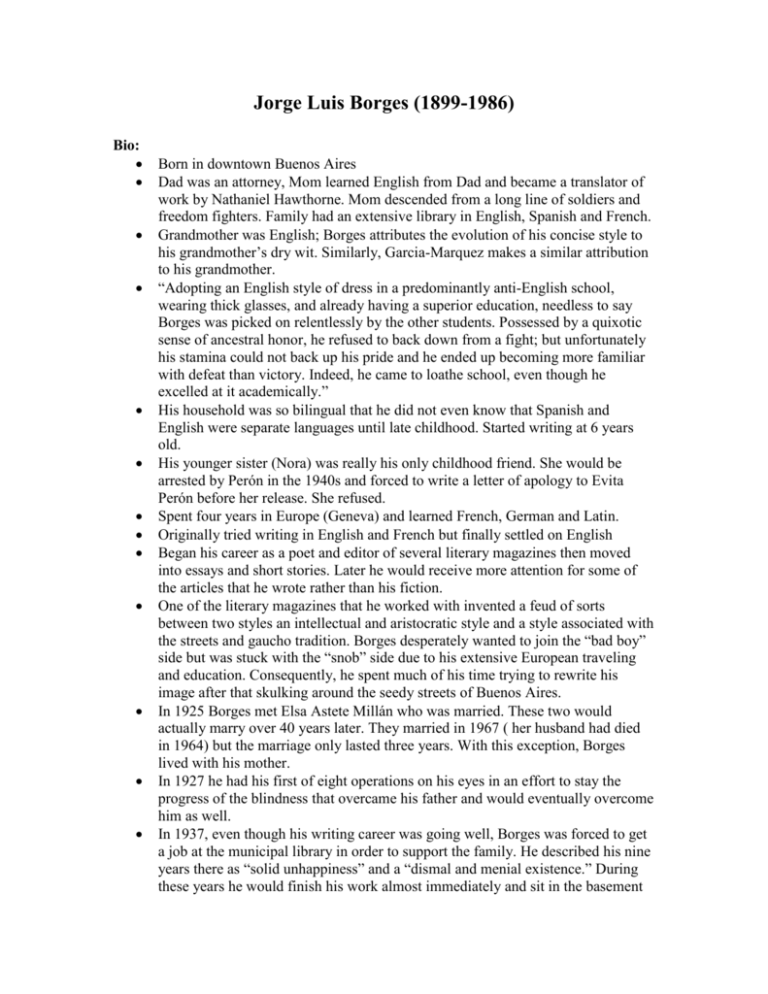
Jorge Luis Borges (1899-1986) Bio: Born in downtown Buenos Aires Dad was an attorney, Mom learned English from Dad and became a translator of work by Nathaniel Hawthorne. Mom descended from a long line of soldiers and freedom fighters. Family had an extensive library in English, Spanish and French. Grandmother was English; Borges attributes the evolution of his concise style to his grandmother’s dry wit. Similarly, Garcia-Marquez makes a similar attribution to his grandmother. “Adopting an English style of dress in a predominantly anti-English school, wearing thick glasses, and already having a superior education, needless to say Borges was picked on relentlessly by the other students. Possessed by a quixotic sense of ancestral honor, he refused to back down from a fight; but unfortunately his stamina could not back up his pride and he ended up becoming more familiar with defeat than victory. Indeed, he came to loathe school, even though he excelled at it academically.” His household was so bilingual that he did not even know that Spanish and English were separate languages until late childhood. Started writing at 6 years old. His younger sister (Nora) was really his only childhood friend. She would be arrested by Perón in the 1940s and forced to write a letter of apology to Evita Perón before her release. She refused. Spent four years in Europe (Geneva) and learned French, German and Latin. Originally tried writing in English and French but finally settled on English Began his career as a poet and editor of several literary magazines then moved into essays and short stories. Later he would receive more attention for some of the articles that he wrote rather than his fiction. One of the literary magazines that he worked with invented a feud of sorts between two styles an intellectual and aristocratic style and a style associated with the streets and gaucho tradition. Borges desperately wanted to join the “bad boy” side but was stuck with the “snob” side due to his extensive European traveling and education. Consequently, he spent much of his time trying to rewrite his image after that skulking around the seedy streets of Buenos Aires. In 1925 Borges met Elsa Astete Millán who was married. These two would actually marry over 40 years later. They married in 1967 ( her husband had died in 1964) but the marriage only lasted three years. With this exception, Borges lived with his mother. In 1927 he had his first of eight operations on his eyes in an effort to stay the progress of the blindness that overcame his father and would eventually overcome him as well. In 1937, even though his writing career was going well, Borges was forced to get a job at the municipal library in order to support the family. He described his nine years there as “solid unhappiness” and a “dismal and menial existence.” During these years he would finish his work almost immediately and sit in the basement of the library the rest of the day translating. He was the first to translate Woolf and Faulkner into Spanish. In 1946 when Juan Perón took power, Borges lost his job. This turned out for the best as he got a position as a lecturer of literature. However, Juan Perón made life difficult for the Borges family. In 1955, Borges regained favor and became the director of the National Library. At this time he was nearly blind and said: "I speak of God's splendid irony in granting me at one time 800,000 books and darkness." During the 1960s Borges international fame exploded and he traveled and lectured extensively in both the United States and Europe. In 1970, he met María Kodama who was a student attending one of his lectures. Their friendship deepened and he would marry her during the last year of his life. In 1973 when Juan Perón returned from exile and was elected president again, Borges resigned his position as Director of the National Library in protest. 1975 his mother dies at the age of 99. In 1986 he died of cancer. “The Garden of Forking Paths” : Originally published in 1941 in a collection of the same name. Added to a more extensive collection and republished in 1944. Unique approach to time and space Story is often marketed as detective fiction but that seems rather a misnomer Philosophical and scientific underpinnings to the story Presented through non-European culture; imported from “orient” to provide the “ultimate other” Story is not within the labyrinth but just describes it; however Borges does suggest other paths Juxtaposition of description that does not evolve out of the plot Borges is cerebral as a writer therefore frequently philosophical in his work Story starts on a fragment-missing two pages; creates document that doesn’t really exist Has a text within a text – Chinese box concept Extensive use of detail Details anchor reader for the magical – history book almost acting like science; reference to a history book, statement signed and quoted verbatim but has anecdotal tone rather than legal footnote; this is truly a maze of texts Who is the author? Who is the narrator? His work and legacy: Created his own brand of “post-avante-garde” literature described as “the process of critical self-examination that reveals the moment in which literature becomes a reflection of itself, distanced from life—in order to reveal the formal and intellectual density involved in writing.” His work often included reflections on “traditional metaphysical problems such as death, time and identity.” Metafiction as defined by the Oxford English Dictionary: Fiction in which the author self-consciously alludes to the artificiality or literariness of a work by parodying or departing from novelistic conventions (esp. naturalism) and narrative techniques; a fictional work in this genre or style. Elegy Oh destiny of Borges to have sailed across the diverse seas of the world or across that single and solitary sea of diverse names, to have been a part of Edinburgh, of Zurich, of the two Cordobas, of Colombia and of Texas, to have returned at the end of changing generations to the ancient lands of his forebears, to Andalucia, to Portugal and to those counties where the Saxon warred with the Dane and they mixed their blood, to have wandered through the red and tranquil labyrinth of London, to have grown old in so many mirrors, to have sought in vain the marble gaze of the statues, to have questioned lithographs, encyclopedias, atlases, to have seen the things that men see, death, the sluggish dawn, the plains, and the delicate stars, and to have seen nothing, or almost nothing except the face of a girl from Buenos Aires a face that does not want you to remember it. Oh destiny of Borges, perhaps no stranger than your own. -- Jorge Luis Borges References: http://www.themodernword.com/borges/ Dictionary of Literary Biography, Volume 113: Modern Latin-American Fiction Writers, First Series. A Bruccoli Clark Layman Book. Edited by William Luis, Vanderbilt University. The Gale Group, 1992. pp.67-81.
